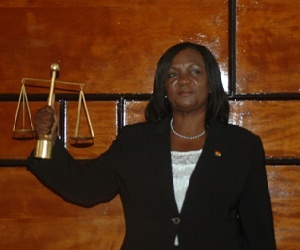A group calling itself GOEVAC-PFG held a press conference on the 2nd of September 2010, at which they called on the CJ to resign on the grounds that “she displayed some level of incompetence and misuse of her office during the 2008 presidential run-off.”
This issue about whether or not the CJ has power to invite a court to sit on a public or statutory holiday has been explained elsewhere, but since the group’s press conference and unsavoury remarks about the Honourable CJ were given very wide media coverage, it is crucial that the office of the CJ sets the facts straight to enlighten the Ghanaian Public on the role the CJ played in the entire matter.
BACKGROUND FACTS
On the 17th of July 2008, the CJ delivered a speech at the formal launch of the PEACE AND DEVELOPMENT CONCERT, at the British Council, at which gathering she was made the official PEACE AMBASSADOR and made the following pledge:
“One constant source of trouble is disputed elections…I would like to assure the good people of Ghana who have entrusted us with judicial power that we are committed and ready to contribute to promoting peace and good governance. I appreciate the sobering fact that an important safeguard of election integrity lies in an effective resolution of complaints and appeals with minimum delay.”
Again, on the 9th of September, 2008, the CJ, at the invitation of the Institute of Democratic Governance (IDEG), addressed a public forum on: “The role of the judiciary in ensuring free and fair elections.”
The political parties including the NDC were duly represented at this well attended public forum. One of the critical observations the CJ made was that:
“Disputes are the inevitable by-products of any keen contest over limited resources, and a contest over political power, in young or emerging democracies, in particular, is no exception. Our sister country Nigeria went through this challenge and it should not come as a surprise if Ghana experiences her fair share of election related disputes, either before, or more particularly, after the December presidential and parliamentary elections.
An impartial and trustworthy or credible judiciary is the guardian of the rights of the individual. To ensure election integrity therefore, persons who may perceive that the electoral process has been abused, or may question the process in one way or the other, have a constitutional right to file election petitions in the courts for resolution. In one short sentence:
The critical role the Justice system must resolutely and effectively play, is to address electoral disputes justly, firmly and effectually with minimum delay.”
CJ made an open pledge to the people of Ghana to put in measures that would ensure a just and timely disposal of all election related- disputes and electoral offences, by extending the normal court sitting days. The pledge together with the rationale underlying it and how the judiciary intended to achieve its set goals are all fully captured in the address Her Ladyship delivered on that occasion as appendix A.
With funding from the UNDP, the Honourable Chief Justice set up a task force to develop a manual on electoral disputes adjudication in Ghana. It is a simple, handy, and easy- to- digest manual on the law (case law included) and practice on election related adjudication in Ghana.
The idea behind the publication was to equip and appraise judges, lawyers, political parties and other stakeholders in justice delivery, of the substantive law, as well as the rules of procedure on the adjudication of such disputes.
The general public, security services, the Bar, Traditional rulers, and political parties were represented at the subsequent launch of the manual on the 11th of November, 2008, and presented with copies. Again the speech delivered at this event is attached as appendix B.
The Judicial Training Institute followed this up with a capacity building workshop on the 17th of November, 2008, for all judges and court personnel who were to serve in these specialised courts. The matters examined included the days of sitting, which the CJ decided must include weekends and statutory holidays, a decision which was taken in absolute good faith to ensure the timely disposal of cases. The Electoral Commissioner, Dr. Afari-Gyan, was one of the main resource persons.
It is to be noted that all of these activities were given very wide publicity by the media. These interventions were captured in the European Union Observation Final Report on the 2008 elections. The relevant page 27 is also attached as appendix C.
It is to be observed that not one single objection by way of either a court action, written or oral objection was raised by any person or body of persons against the decision that courts open for business on what is known as non-days, that is, weekends and statutory or public holidays. Nobody, including the late Mr. B. J. da Rocha, questioned the constitutionality or legality or impropriety of the decision taken solely in the supreme interest of this nation, with the sole aim of disposing of these type of disputes expeditiously.
More importantly, on the 3rd of December, 2008, the CJ caused the necessary directives to be issued to all judges, registrars and other court officials appointed to serve in these courts. Drawing on the powers conferred on her by the Constitution and the Order 79 rule 1 (1) of the High Court (Civil Procedure) Rules, 2004, CI 47, CJ expressly directed the courts to sit on weekends and statutory or public holidays.
The rule reads: Days and hours of sittings “1 (1) Subject to the Courts Act, 1993 (Act 459) as amended, the Chief Justice may appoint any day including vacations for the hearing of causes or matters as circumstances require. “ A copy of this self explanatory directive is attached as appendix D.
THE NPP ELECTION PETITION
It must be explained that the CJ, as head of the Judiciary and in her administrative capacity, has no constitutional or statutory discretionary authority whatsoever, to decide which writ, petition, application or other court process filed by any citizen of this land in any of our registries, deserves to be placed before a court of competent jurisdiction for determination.
In other words, no matter however, wrong or defective a writ or application may appear to be, the CJ has no option but to place the matter before the court for determination in accordance with law. Indeed, any attempt, by a CJ, using any means whatsoever, to prevent any such court process from being placed before the courts would be clearly unconstitutional, subversive of the laws of this land and a grave and unlawful interference with the citizen’s fundamental right to access justice. It is such conduct which should attract the severest of criticisms, and or sanctions.
When the Registrar of the Fast Track therefore drew attention to the filing of the petition and or application, the CJ had no option but to instruct the Registrar to set all necessary processes in motion and place the matter before the court for it to be disposed of expeditiously. The CJ exercised her powers lawfully, competently, of and with the sole purpose of having the matter disposed of expeditiously, given the peculiar facts of the case. Everything was done transparently and in utmost good faith.
In this regard, the lawful authority she exercised was to decide which judge was to sit on the case, the pace of adjudication, which necessarily implied choosing the days of sitting, in accordance with the lawful and proper directives I had earlier issued, given the date of the pending Tain elections.
Ever mindful of her judicial oath to do justice to all manner of persons, the CJ would have taken those same crucial steps had the writ emanated from some person(s) other than the NPP. Can we imagine the consequences, if the application had been filed by some other person(s), and the C J purporting to act under one authority or the other, had prevented the matter being placed before the courts?
The CJ did not take an ad hoc decision to assist the NPP access the courts illegally or even clandestinely; in order to derail the constitutional process and prevent the will of the people from being enforced in the elections as is alleged by some people. To the contrary, she carried out what clearly was her constitutional and lawful duty in the supreme interest of the nation; with no intention whatsoever of throwing this country into anarchy. These steps were taken in line with a transparent and well structured programme, which had been drawn ahead of the elections, and brought to the attention of all stakeholders.
At the trial, the judge overruled a preliminary objection raised that the court lacked jurisdiction to sit on that particular day. Up to this present day, that ruling has not been appealed against, neither has the constitutionality or legality of the actions taken by the CJ, the Judge or Registrar been challenged in any court of law.
We have been informed that the CJ was not mentioned in the alleged confession by Atta Akyea. Be that as it may, the CJ emphatically states that at no time did she align with and collude with the NPP to file the petition and application; neither did she coach them on how to go about their work. She categorically states that that she does not know the circumstances under which these processes came to be filed in court.
Indeed had there been any such collusion, there would have been, from the onset, an agreement on which judge could be manipulated to suit the petitioner. The judge nominated by the CJ was the judge who handled the petition and application throughout its lifetime in court. At no time was an application objecting to the choice of that particular judge ever filed and brought to Her Ladyship’s attention.
It is plain from the foregoing the basis on which the case involving an NDC parliamentary candidate proceeded on Christmas Day. That power was exercised by the judge/magistrate in accordance with the programme which had been previously set out for the expeditious disposal of electoral offences. A rejoinder which was issued at the instance of the Judicial Service and published by the Palaver newspaper in early January 2009 explained these matters in detail.
WEEKEND COURTS For well over a year, by lawful authority under the hand of the CJ, at least two courts sit every Saturday, which is a non –day, to hear cases involving Social Security defaulters.
CONCLUSION
In the speech delivered at the launch of the Election Manual on the 11th of November, 2008, Her Ladyship made the following pertinent remarks:
“Much as no one is happy about losing a case in court, we do know that most times disputants and their lawyers carry exaggerated opinions about the likely success of their cases in court, pushing the blame on everybody else, particularly the judge, when things do not work out as expected, and feeding clients and the unsuspecting general public with false information, about the conduct of the judge, and as to why they lost. This does not augur well for the administration of justice in our country. It undermines public trust and confidence in the judiciary, the institution which undeniably is the ultimate channel for addressing conflict.
It is therefore our expectation that the public will reciprocate our good gesture by offering useful suggestions, fair and constructive criticisms that will improve qualitative justice, the rule of law and boost public confidence in the judiciary; not otherwise. Scurrilous or vitriolic attacks on the person of judges, wicked and unfounded allegations, open and veiled threats against judges are just unacceptable, beyond the bounds of decency, and are indeed wrong approaches to expressing dissent if indeed they are genuine dissent in constitutional democracies…. The judiciary does not claim infallibility; we only ask that that our judges be treated with respect, civility and decency. We destroy our governance institutions and the reputation of others through unguarded, malicious or mischievous statements to our own disadvantage.”
The Hon. CJ spoke as a prophet, considering the turn of events now!
We have made full disclosure of the actions the CJ took in this matter and the basis of those actions. Anyone who believes she has intentionally violated any laws of this land has a constitutional right to set the necessary constitutional provisions in motion for the appropriate sanctions to be taken against her.
Signed:
G.A TAGOE(MRS.)
DIRECTOR OF COMMUNICATIONS
FOR: JUDICIAL SECRETARY

















